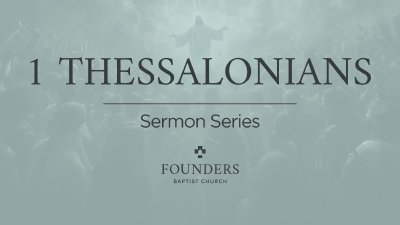It was, perhaps, in the summer of the year 50 A.D. that Paul, Silas, and Timothy, arrived in the thriving, cosmopolitan city of Thessalonica.
It was a city located on the Via Egnatia, the famous Roman road that connected Rome to the East. That road stretched from what is today, Albania, to Constantinople, Istanbul. It was a harbor city, and the only port that existed on this road, and so the city was very influential.
It was a free city, allowed to manage its own political affairs in a way that few Roman controlled cities could. Fewer taxes, rulers that they chose for themselves, and a population that included all kinds of people. It was truly an international commercial city.
It was one of the largest cities in the Roman Empire and the capital city of the Macedonian province. Population estimates for the time of Paul’s ministry range from 100,000 to 250,000 people.
The missionary team that arrived in Thessalonica had just been beaten and imprisoned at Phillipi. God had miraculously delivered them from that prison and marvelously saved the jailor and his household through that deliverance. Earlier, Lydia had been saved, and there were others, but Paul was asked to leave town.
NAS 1 Thessalonians 2:1 For you yourselves know, brethren, that our coming to you was not in vain, 2 but after we had already suffered and been mistreated in Philippi, as you know, we had the boldness in our God to speak to you the gospel of God amid much opposition.
So, when he arrived in the city of Thessalonica, he had traveled 100 miles, shortly after being severely beaten. He had every reason to be timid and afraid, especially when trouble began to raise its head in this city also.
Thessalonica, unlike Philippi, had a large enough Jewish population to have a synagogue. Paul began his ministry there. He reasoned with them for 3 weeks, and as a result, there Jews converted. But then his ministry moved outside the synagogue into the Gentile population, and there were many Gentiles converted. That sparked Jewish jealousy, and the conflict was on once again.
Paul was torn away from them (ESV 2:17), and they were forced to flee the city (Acts 17:10).
We can’t be certain of how long Paul was in Thessalonica, but several considerations indicate that it was longer than his 3 weeks reasoning in the synagogue. The Philippians sent support for him more than once (Phil 4:16). But regardless of how long he was with them, it was a relatively short amount of time, and he couldn’t give them a lot of teaching.
Paul left Timothy and Silas in Berea after they were run out of Thessalonica, and he went on to Athens. Sometime after Paul was in Athens, Silas and Timothy met him there, and out of concern for churches Paul was willing to be left alone in Athens and dispatch them to find out about the churches.
ESV 1 Thessalonians 3:1 Therefore when we could bear it no longer, we were willing to be left behind at Athens alone, 2 and we sent Timothy, our brother and God's coworker in the gospel of Christ, to establish and exhort you in your faith,
It was after Paul was in Corinth, and reunited with Timothy, that this letter was written in response to Timothy’s report and Paul is rejoicing at what he has heard.
Chapter 1 is a record of his rejoicing, as he tells them about what he has seen in them and heard about them.
Chapter 2 is a reminder of his ministry among them.
Chapter 3 is an explanation of his affection for them, why he sent Timothy to them, and his reaction to Timothy’s report.
Chapter 4, he exhorts them to live holy lives, and follows that exhortation with comfort considering a true understanding of the return of Jesus Christ.
Chapter 5 begins with explanations about the day of the Lord, and then ends with closing exhortations and a final desire for their blessing.
Today we begin looking at this first chapter, and the chapter is amazing.
The chapter can be divided into 5 sections.
Verse 1 – How we regard you (Paul, Silvanus, and Timothy).
Verses 2-3 – How we pray for you.
Verse 4 – What we know about you.
Verses 5-7 – Why we are certain about you.
Verses 8-10 – What has become of you.
We are going to look at each of those five sections, but as we do we need to notice what this chapter represents.
It is Paul, on behalf of Silas and Timothy, telling this church what he believes about them and what he and others have seen in them.





